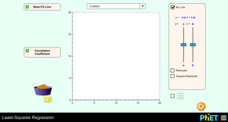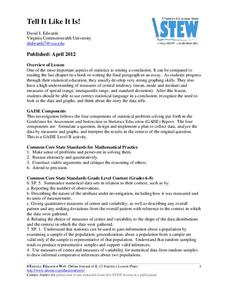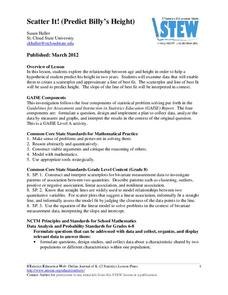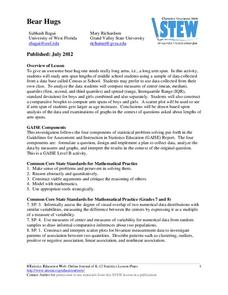Teach Engineering
Dirty Decomposers
Do not let the class just sit and rot. Pupils learn how decomposition and nutrient recycling is important to an ecosystem. Groups design an experiment to determine how environmental conditions affect decomposition. They develop a poster...
North Carolina State University
Exploring Genetics Across the Middle School Science and Math Curricula
Where is a geneticist's favorite place to swim? A gene pool. Young geneticists complete hands-on activities, experiments, and real-world problem solving throughout the unit. With extra focus on dominant and recessive genes, Punnett...
Wordpress
Equation Table Graph
Your Algebra learners will appreciate this fabulous, two-page printable. The first page has a list of numbers that lead to the learners writing an equation in a cloud that represents these numbers, and then filling in a table, and...
Curated OER
Hand Span and Height
Is there a relationship between hand span width and height? Statisticians survey each other by taking measurements of both. A table that can hold data for 24 individuals is printed onto the worksheet, along with questions for analysis....
Curated OER
8.SP.1Texting and Grades I
Here is a fitting question for middle schoolers to consider: Is there a relationship between grade point average and frequency of sending texts? Starting statisticians examine a scatter plot and discuss any patterns seen.
Northwest Career & Technical Academy Foundation
Stand Up. . . Be InCtrl!
What is the difference between a bystander and an upstander? A collaborative project created through digital media helps the class understand that they can participate in an online community respectfully and responsibly. They consider...
Texas Instruments
Is It or Isn't It Proportional
How can you tell if number relationships are proportional? Mathematicians investigate proportional relationships. They compare and contrast functions and graphs to determine the characteristics of proportional relationships, as well as...
K20 LEARN
You’re The Network: Data Analysis
How do you rate? Young scholars use graphical data to analyze ratings of different television episodes. Their analyses include best-fit lines, mean, median, mode, and range.
Workforce Solutions
30 Seconds
Thirty seconds are all scholars have to develop an engaging commercial to showcase their talents and experience within a specific occupation. Pairs work collaboratively to keep each other on time to deliver information speedily and ask...
PBS
Take It in Stride
One step at a time, pupils practice their measurement techniques as they analyze their stride length. They design their own procedures for measuring and relate their stride measurements to the distance traveled by making calculations.
PBS
House Warming
Things should heat up during a hands-on lesson exploring solar energy. An enlightening activity challenges young scientists to design a structure that collects solar energy efficiently. They keep track of temperature data over time and...
PBS
Breaking Point
Leaf toughness can add to its herbivore appeal. Learns design an experiment to quantify leaf toughness and then perform their procedures. They follow the experiment with a set of questions that ask them to think about how leaf toughness...
PBS
Insulation Station
It's all about the material. Learners experiment with different substances as they try to keep an ice cube from melting. They draw conclusions by answering a set of questions about the types and amount of material that had the best result.
Teach Engineering
Powering a Device Using Food
Eat up a resource on using food to power electrical devices. Future engineers first experiment with different fruits and vegetables to determine the amount of electrical energy they provide. Based on the data, they design and create an...
Teach Engineering
Exploring Variables While Testing and Improving Mint-Mobiles (for Middle School)
There are more ways to use mint candies than to just eat them. In groups, learners design and build race cars using mint candies, drinking straws, Popsicle sticks, index cards, and other materials. They decide on an independent variable...
Concord Consortium
People and Places
Graph growth in the US. Given population and area data for the United States for a period of 200 years, class members create graphs to interpret the growth over time. Graphs include population, area, population density, and population...
PHET
Least-Squares Regression
Less is best when looking at residuals. Scholars use an interactive to informally fit a linear regression line to data on a scatter plot. The interactive provides a correct best fit line with residuals and correlation coefficient to...
CCSS Math Activities
Smarter Balanced Sample Items: 8th Grade Math – Claim 4
A math model is a good model. A slide show presents 10 sample items on modeling and data analysis. Items from Smarter Balanced illustrate different ways that Claim 4 may be assessed on the 8th grade math assessment. The presentation is...
CCSS Math Activities
Smarter Balanced Sample Items: 8th Grade Math – Target J
Look at patterns in bivariate data. Eight sample items illustrate the eighth grade statistics and probability standards. The Smarter Balanced Sample multiple-choice items focus on numerical and categorical bivariate data. The slide show...
American Statistical Association
EllipSeeIt: Visualizing Strength and Direction of Correlation
Seeing is believing. Given several bivariate data sets, learners make scatter plots using the online SeeIt program to visualize the correlation. To get a more complete picture of the topic, they research their own data set and perform an...
American Statistical Association
Tell it Like it is!
Scholars apply prior knowledge of statistics to write a conclusion. They summarize using correct academic language and tell the story of the data.
American Statistical Association
Scatter It! (Using Census Results to Help Predict Melissa’s Height)
Pupils use the provided census data to guess the future height of a child. They organize and plot the data, solve for the line of best fit, and determine the likely height and range for a specific age.
American Statistical Association
Scatter It! (Predict Billy’s Height)
How do doctors predict a child's future height? Scholars use one case study to determine the height of a child two years into the future. They graph the given data, determine the line of best fit, and use that to estimate the height in...
American Statistical Association
Bear Hugs
Scholars research arm span to determine who gives the best bear hugs. They use data from a national study to find the standard statistics for arm span. It includes mean, median, quartiles, spread, standard deviation, and more.

























